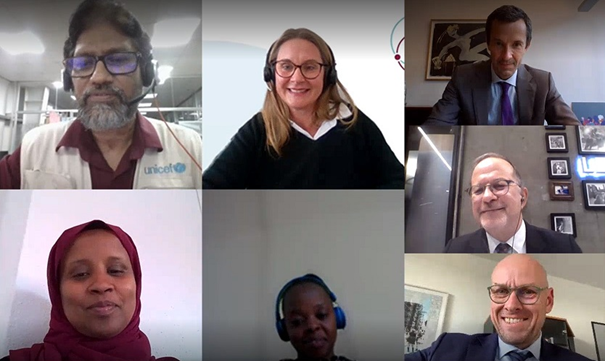Recap: Webinar "Germany’s Last Mile Initiative: Turning Vaccines into Vaccinations"

On 4 October, 2022 the Global Health Hub Germany hosted an online event on the challenges associated with achieving widespread COVID-19 vaccination worldwide and how Germany’s Last-Mile-Initiative is helping to address these challenges.
Why do COVID-19 vaccination rates continue to lag behind in many low- and middle-income countries while Germany and most European countries have relatively high vaccination coverages? What are the biggest challenges in turning vaccines into vaccinations?
To discuss these and other questions, the Global Health Hub Germany hosted an online event on "Germany’s Last-Mile-Initiative" on 4 October 2022 with representatives from the German Federal Foreign Office and the German Ministry for Economic Cooperation and Development as well as experts who are implementing the Last-Mile-Initiative on the ground in Somalia, South Africa and Bangladesh. The meeting was moderated by Inke Fabian de Barreto, Head of the Health and Social Development at GOPA Consultants and Member of the Steering Committee of the Global Health Hub Germany.
What is the Last-Mile-Initiative?
While the early days of COVID-19 vaccine development were characterized by insufficient availability of vaccine doses, the challenge now lies in turning vaccines into vaccinations. This so-called “last mile” is often constrained due to logistical difficulties, weak national health systems and other urgent, crisis-driven political priorities, but also, vaccine skepticism and disinformation. Under its G7 presidency, Germany therefore aims to rapidly increase vaccination coverage and absorption capacity in countries of the Global South through concerted efforts. The G7 Foreign Ministers have endorsed an Action Plan, supporting 115 countries with 4 billion US-Dollar. In the context of the Last-Mile-Initiative, Germany supports and strengthens the logistical infrastructure in partner countries by purchasing and delivering necessary ancillary tools and materials, training frontline workers and supporting vaccination and awareness campaigns with 850 Million Euros. A special focus is being put on reaching the most vulnerable populations, such as those living in fragile humanitarian contexts, to ensure that nobody is left behind. The projects are commissioned by the Federal Foreign Office and the Federal Ministry for Economic Cooperation and Development and implemented by collaborating with national authorities and international partners such as UNICEF, WHO, Gavi’s joint vaccine delivery partnership and non-governmental actors but also KfW and GIZ. “Implementing the Last-Mile-Initiative is a true team effort”, both Director General Günter Sautter, Federal Foreign Office and Director General Dirk Meyer, Federal Ministry for Economic Cooperation and Development agree.
What has been reached so far in the context of Germany’s Last-Mile-Initiative?
“There has been enormous progress made since the beginning of 2022” reflects Ted Chaiban, the Global Lead Coordinator of the COVID-19 Vaccine Delivery Partnership, as the initiative has improved aligning with partners, improved technical assistance as well as cold chain systems and health management information systems but also strategies to reach vulnerable groups like the elderly. To date, the vaccination rate of the 92 low- and middle-income countries that were approved by the GAVI board to access vaccines through the COVAX Advance Market Commitment, has increased from 28% to 51% and 120 million doses have been distributed in the context of the Last- Mile-Initiative.
“The Last-Mile-Initiative has given us the opportunity to reach the deep rural areas in South Africa”, states Kholo Makena, the Managing Director at Broadway Legacy Foundation of South Africa. In Somalia, a country impacted by decades of conflict and other crises such as droughts and food insecurity, the vaccination rate has almost doubled from 7.7% to 14% since the vaccination roll out in March 2021, reported Dr Ubah Farah Ahmed, the Head of the Family Health Department at the Federal Ministry of Health Somalia. Dr Mainul Hasan, a UNICEF Health Specialist in Cox’s Bazar (Bangladesh) shared his perspective from working in one of the world’s largest refugee camps. He stressed the importance of microplanning and of incorporating the needs and backgrounds of the target group.
Despite the great efforts and achievements made since the start of the Last-Mile-Initiative, there are still many challenges that hinder widespread COVID-19 vaccination in many low- and middle-income countries.
What are key steps to move forward with the Last-Mile-Initiative?
Based on the experiences made on the ground, some key suggestions were discussed on how to further strengthen the efforts of the Last-Mile-Initiative.
As many of the countries where the Last-Mile-Initiative is being implemented are facing multiple crises and poor health systems in addition to the COVID-19 pandemic, the Last-Mile-Initiative should also strengthen primary healthcare and health systems in general. Investments need to be made in sufficient and well-trained health workers, but also in the provision of cold chain systems as well as health management information systems. Sometimes unconventional solutions must be found with local experts on the ground, as was the case in Haiti, where donkeys were purchased as part of the Last-Mile-Initiative in order to reach remote communities.
In addition, strengthening inclusivity in the implementation of the Last-Mile-Initiative through cooperation with different actors such as local authorities, NGOs, but also youth groups and others is essential and needs to be further strengthened. The local expertise, facilitated access to target groups, and the creation of tailor-made solutions when working with community leaders should not be underestimated.
Overall, the measures taken under the Last-Mile-Initiative should generate an impact beyond the COVID-19 pandemic and strengthen local health systems, and therefore should be structured sustainably.
The representatives of the respective ministries as well as the experts from the ground agreed that the Last-Mile-Initiative has already made a lot of progress and should be further pursued in a joint effort to tackle the COVID-19 pandemic, but also to make countries and societies resilient for future pandemics.